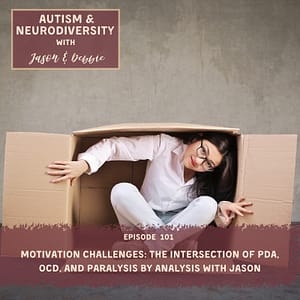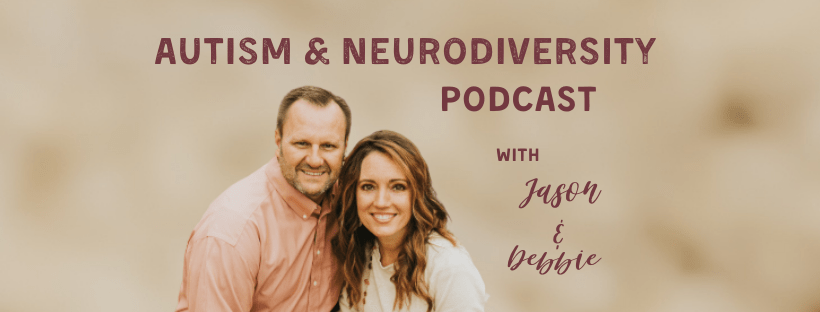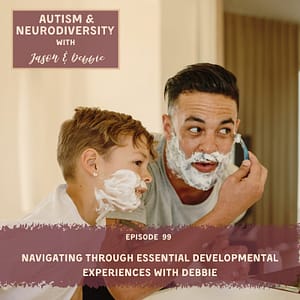Speaker A: Welcome to the Autism and Neurodiversity podcast.
Speaker B: We’re here to bring you helpful information from leading experts and give you effective tools and support. I’m Jason Grygla, a licensed counselor and founder of Techie for Life, a specialized mentoring program for neurodiverse young adults.
Speaker A: And I’m Debbie Grygla, a certified life coach. And maybe most importantly, we’re also parents to our own atypical Young Adults.
Speaker A: Friends. Hello. Welcome. I want to talk to you about navigating through essential developmental experiences, because development’s challenging, it’s messy, and for our autistic and our neurodivergence, it can be sometimes especially frustrating. And there’s essential experiences that we all need to go through and to be able to develop. And the way we navigate through those can either really support development and be really positive or can actually hinder development. And I know that if you’re listening to this podcast, you want to be erroring on the side of being able to support development and growth and well being and success and happiness and quality life.
There’s just a few things I’d like to touch on in this episode to kind of support you in this, because there’s some foundational things to understand, and it’s kind of sometimes almost non intuitive. It’s not what we naturally want to do or what our natural tendency might be, and it might not be how we were parented. And so I want to offer you a few perspectives on this, because when they’re going through some of those essential experiences that are just part of development and we come in with the wrong approach or just non effective approaches, we can almost do more harm than good and really set back development. And I know you don’t want that, so let’s just jump in.
We got back into mountain biking. The weather’s been great. We’ve had, after a very rainy winter and not many opportunities to go mountain biking. Jason and I got to go out and go mountain biking together, and we hit a trail, or we were going to go to a trail that I was familiar with to kind of just get warmed back into it. I’m still learning skills. He’s the mountain bike coach or one of the coaches for the high school mountain bike team and has done it a lot more and is more skilled at it than I am. But I’m like learning, and I’m enjoying it. And we went to the trail that I was comfortable with that was kind of easy for me. I felt safe doing.
We go to that trail, and as luck would have it, there was a race going on, and so the trail was closed to regular people that weren’t part of the race. And so Jason’s like well, that’s okay. We’ll go try another trail. And so we took a further drive up near Zion National Park and went out this beautiful trail up on a bluff, I think it’s called, and just amazing scenery, gorgeous. But it was a tricky trail. It had like what they call crunchy rock. And I had never been on a trail like that before. I’d been on dirt trails, I’d been in kind of mountainy trails, but not like this crunchy, different kinds of rocky stuff. It was just a much more technical kind of trail and I was a little nervous about it. But Jason’s, like, if there’s rough parts, we’ll just walk them. We’ll just do the best we can, and I’m with you in it, and I think you can do this.
And so we get going on it. And it was tricky. I had not done a trail like that before. And as I started in, it was like, oh, I don’t know if I can do this. And I was walking a lot of parts and kind of nervous about it. But then as we kept going, I started to kind of get the hang of it. I got the feel of what it is to kind of just trust the bike and ride through and pick pick my line and keep going right and work through it. And there were parts where even Jason was walking his bike. There were some pretty technical spots, but it’s funny because there was a few spots that were tricky. And I started to get a little overconfident and man, did I wreck myself. Totally fell down on my bike. And I had some pretty awesome bruises to show from it.
But with Jason there being calming and reassuring and pointing out things, kind of guiding me along, being there with me in it, I was able to learn and pick up some things that I would not have been able to pick up if I hadn’t tried a more challenging trail like that. And even in my fall, there was some great lessons there. I went off the trail a little bit and just thought I could handle it and realized, oh, that kind of section, the bike doesn’t go on and I wrecked or I don’t have the skill to lift my bike when I’m riding. And so I was learning things from it and learning things about myself and what I could handle.
And this is just part of the grind of development. And taking on a new challenge is some of that struggle that we go through. And it can be challenging to watch that happening in our young people that have maybe extra challenges when they’re autistic and they’re neurodivergent. And so I just want to point out some things with this. When your young person is going through developmental experiences, when they are experiencing challenges, I can’t stress enough how important it is that they start to develop a sense of autonomy, that we aren’t just jumping in and rescuing or telling them everything they’re supposed to do or doing it for them, but that we give them as many opportunities as possible for them to have a sense of their own free will and choice in what they’re doing and some autonomy to figure it out and to try it and figure out for themselves what works and what doesn’t. Or what do they want to try? And what do they not want to try?
It’s maybe frustrating when they’re younger because they’ll exercise their autonomy and it takes longer and they don’t do it well and it slows everything down. But it’s so valuable to make space for that time for them to tie their shoes even though it takes longer and you’re trying to get out the door, but having that little experience. And over time then they start to get that skill and then gain confidence. It’s amazing for them and to be in the habit of allowing for them to have autonomy, because as they get older and they become an adolescent or a young adult, being able to have that sense of autonomy is going to be such an important skill.
As they shift into becoming an adult and relying on themselves more and more. And we want that for them. So when you’re going through these essential developmental experiences, the more you can support their autonomy, the more they’re going to develop and have resilience and problem solving skills and confidence and wins under their belt. And the second thing is recognizing that they’re going to fail a lot and that’s not a problem. Don’t waste a good fail. I say this all the time to parents when I’m coaching. It’s like you don’t want to waste a good fail. There are so many opportunities in a fail to be able to connect and be that support and show that you are there for them, that you care about them, that you love them even when they fail. That is such an important message for them to internalize and to make a part of themselves that they are valuable and worthy even when they fail, and that you’re going to be there for them in those fails, through those fails. It’s such a great opportunity to connect with them and then actually collaborate for their growth and progress.
I mean, Jason watched me fall and I’m sure he didn’t enjoy watching me fall or seeing me fall, but he’s there with me in it and I knew he’s there. He cared for me, he wasn’t judging me, he might tease me a little, but we actually connected through those struggles and it made me want to even try harder and be there in it and listen to his advice through it. Because I knew that he cared about me even when I was struggling and he still believed that I could keep going and I could do it and figure it out. So don’t waste a good fail.
There’s such rich opportunities not only to strengthen your relationship and your connection to them, to send them the message that you love them, that you believe in them, that they can figure it out and do it, and that this is part of development. This is normal, natural, you’re going to fall, you’re going to make mistakes, you’re going to screw up. It’s just part of being human and it’s okay. Such a valuable thing because they are going to fail. We all do.
Then the third thing is we want to align ourselves with them. So it’s so tempting as a parent to want to go in and just do it for them or make sure that they have a win. Oh, they keep having fails and they’re struggling and their self esteem is low, and I just want them to have a win. And so we want to go in and we want to buoy them up and almost like force the win, right?
We want to do it for them or ensure that they can’t fail. I want to encourage you to slow down on that because there’s a lot of unintended messages that you are sending when you have to go in and rescue or do for them or fix it or make sure there’s a win. You’re sending the message that they can’t do it. Now you’re saying, well, but they need support. Well, let me explain. So there’s the one side of it where we do too much for them. We jump in, we rescue, we prevent them from experiencing fails or the natural consequences of something or the logical consequences of something. And then there’s when we just totally abandon them. We just leave them to it and we don’t support at all. And that’s not helpful either. It’s not really fair.
I mean, if Jason just said, yeah, go do that trail out there, or I’m going to ride ahead and you can just follow at your own pace and just left me to it, I would have been in some real trouble because there were some very tricky spots, or I wouldn’t have anticipated where it was tricky and I probably would have really could have hurt myself. So we don’t just abandon them if we know that they’re going to have specific struggles or need supports. What we can do and what is so effective, and you’ll want to start seeing yourself this way is we want to align with them. So not for them and not abandoning them, but align with them. So I’m with you in this. This is a mentoring approach. It’s we’re together, right?
I’m going on this trail. Jason’s done this trail many times before and he’s skilled at it, but he’s mountain biking with me. He brought me along. We’re doing this together and he knows where I’m at and he knows my skill level and he knows what I’m trying to do and he knows how I want to become a good mountain biker. And he’s with me in it. And he’s allowing me to experience the trail, guiding me, pointing out some things, encouraging me. I’d fall or get stuck somewhere, and he’d give a little advice or some encouragement and we kept going together.
I encourage you to align with your child, your teen, your young adult. Hey, let’s tie our shoes together. Let’s do this together. Feels very different than, oh, let me just tie your shoes for you. Let’s hurry and go, or you figure it out. You’ve put those shoes on. No, hey, let’s do it together. Hey, this technique I like, this is how I do it. Or, oh, I like what you’re trying there. We’re together in it when they’re a teenager and they’re trying to sort out the social scene and you’re not going to be there maybe in the social interactions, but to be like, hey, how’d that go? Oh, I get it. When I’m in an awkward situation, I don’t know what to say.
You just feel so stressed and you connect, you relate. You be in the discomfort and the awkwardness with them being with them in it and aligning with them in these experiences, in these developmental experiences, is going to help them feel supported, take off some of the edge of the stress that they’re experiencing because they’re not alone in it. And it builds the kind of relationship where they are receptive to some of your pointers or suggestions and just being aligned. Maybe they do it their own way. They don’t follow your advice, but they are trying their own way, and they feel confident to do it because they know they’re not going to be judged, going to be loved through it. And this becomes incredibly helpful when if you have this kind of relationship when they’re a young adult and they’re still needing some support, they’re still needing some guidance, but they need to do more and more on their own.
They need to be more autonomous to be able to be a more independent, fulfilled adult. But we all need some guidance and support. Healthy adults seek out mentors. We seek out help. And so if you are building this kind of relationship, they’re going to feel comfortable getting support and help, knowing when to ask for it. Then they can keep developing and growing and have the kind of life that they want to have.
I just want to give you that perspective of and it really is like, navigating through just like on my mountain bike as I’m navigating through this crunchy rock and little sections that were tighter and on edges of a cliff and all these things as I’m navigating that and Jason was with me in it, it was a powerful experience for me. It came away going, wow, I can actually do these things. And I became stronger and, oh, but I don’t want to get a little overconfident because that’s when I fell. Probably in the easiest spot on the mountain too. So sad, but had some bruises and some bumps, but I was okay. And I’m a better mountain biker for it, and I’m going to be safer in the long run because of these kinds of experiences.
So navigating developmental experiences with them, right? Giving as much autonomy as possible, letting them exercise their own free will, but being with them in the fails and through the fails and aligning with them on the journey. And you’re? Going to actually have so much more delight in the experience and so much less frustration when we embrace it for what it is our own stress tolerance of the failures and what development looks like. And working through these different experiences and challenges that come, your stress tolerance will increase. And it can be actually really amazing and exciting and exhilarating, just like that mountain was that I’m here now bragging about. This is doable.
And if you are struggling to be that support for your young person that your parenting or working with, I encourage you to seek out a mentor, somebody to coach you or a therapist or someone that’s gone the path before you that you can get support through it. This is not an easy gig. Parenting is complex and nuanced, and we have our own baggage and trauma and crud that we’re dealing with, ourself and our own challenges. And then we’re trying to support this young person. And if they’ve got extra challenges or struggles, it can be a lot. It can be overwhelming. So I encourage you to find people that can align with you and be with you as you’re going through those challenges.
And that’s what Jason and I tried to do here on this podcast. And I encourage you to keep showing up here. And if you know others are struggling, share a podcast. And let’s get the word out that there’s better, more effective ways to approach parenting and working with young people. And we can do a lot of good when we do this work to show up in ways that are actually supportive and helpful. So hope you have an amazing week. Take care.
Speaker A: Thanks for joining us on this episode of Autism and Neurodiversity with Jason and Debbie. If you want to learn more about our work, come visit us at JasonDebbie.com. That’s JasonDebbie.com.



